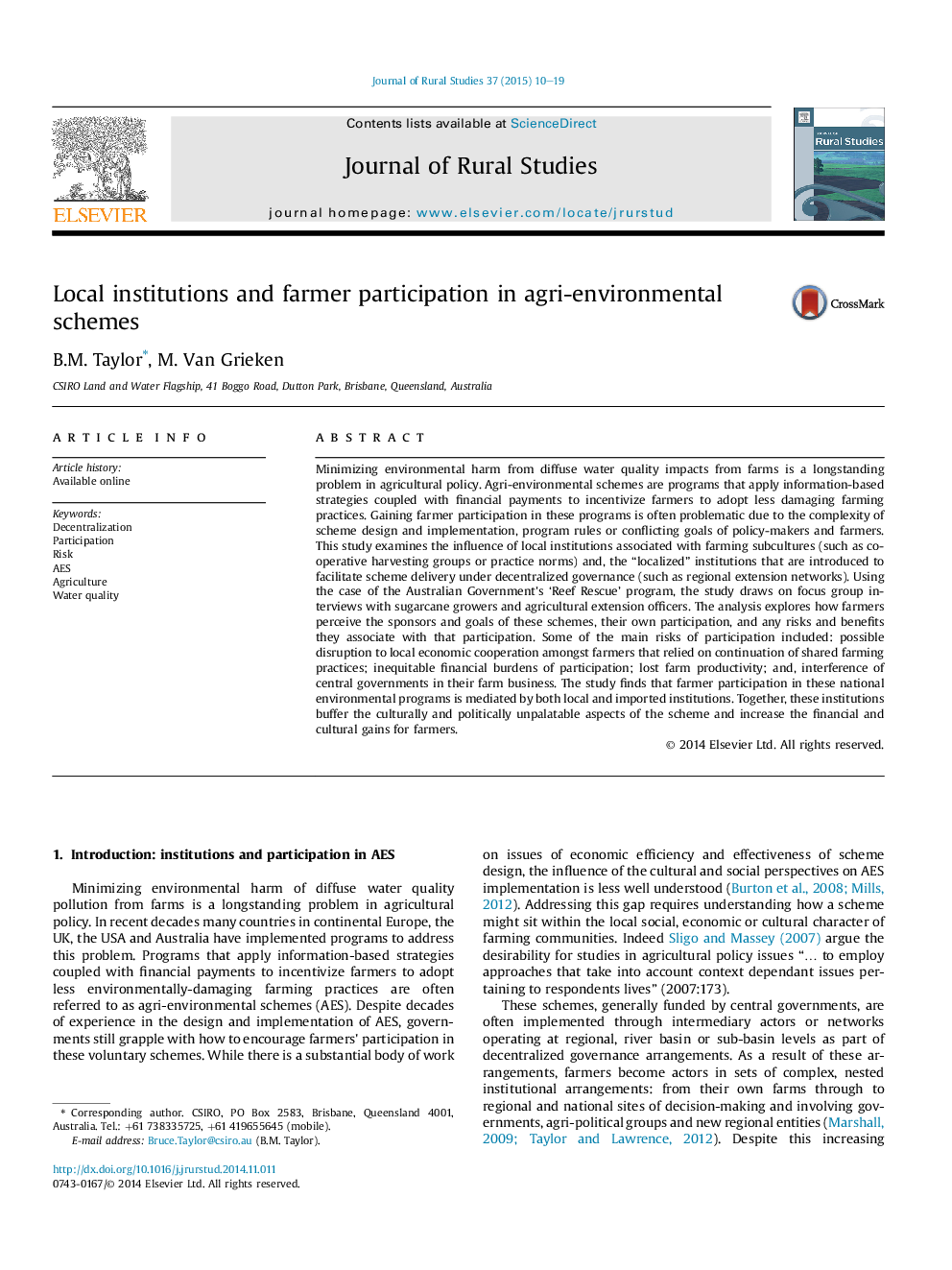| کد مقاله | کد نشریه | سال انتشار | مقاله انگلیسی | نسخه تمام متن |
|---|---|---|---|---|
| 6545696 | 159969 | 2015 | 10 صفحه PDF | دانلود رایگان |
عنوان انگلیسی مقاله ISI
Local institutions and farmer participation in agri-environmental schemes
ترجمه فارسی عنوان
مؤسسات محلی و مشارکت کشاورزان در برنامه های زراعی محیطی
دانلود مقاله + سفارش ترجمه
دانلود مقاله ISI انگلیسی
رایگان برای ایرانیان
کلمات کلیدی
ترجمه چکیده
به حداقل رساندن آسیب زیست محیطی از کیفیت آب منتشر شده از مزارع، یک مشکل دیرینه در سیاست کشاورزی است. طرح های زراعی محیطی برنامه هایی هستند که بر اساس استراتژی های اطلاعاتی همراه با پرداخت های مالی به منظور ایجاد انگیزه از کشاورزان برای اعمال شیوه های کمتر زیست محیطی استفاده می شود. به دست آوردن مشارکت کشاورزان در این برنامه ها، به دلیل پیچیدگی طراحی و اجرای طرح، قوانین برنامه یا اهداف متضاد سیاست گذاران و کشاورزان، مشکل است. این مطالعه تأثیر نهادهای محلی مرتبط با زیر کشت های کشاورزی (مانند گروه های برداشت گروهی یا هنجارهای عمل) را بررسی می کند. مؤسسات معرفی شده برای تسهیل تحویل طرح تحت حاکمیت غیر متمرکز (از قبیل شبکه های توسعه محلی). با استفاده از پرونده "برنامه نجات ریف" دولت استرالیا، این مطالعه به مصاحبه های گروه های متمرکز با کشاورزان نیشکر و افسران توسعه کشاورزی کمک می کند. تجزیه و تحلیل به بررسی اینکه چگونه کشاورزان درک حمایت کنندگان و اهداف این طرح ها، مشارکت خود و هر خطری و منفعتی که با آن مشارکت مرتبط می شوند، درک می کنند. برخی از خطرات عمده مشارکت عبارتند از: اختلال ممکن در همکاری اقتصادی محلی در میان کشاورزان که به ادامه فعالیت های کشاورزی مشترک متکی بودند؛ هزینه مالی نامناسب مشارکت؛ بهره وری مزرعه از دست رفته و، دخالت دولت مرکزی در کسب و کار مزرعه خود. این مطالعه نشان می دهد که مشارکت کشاورزان در این برنامه های ملی محیطی توسط موسسات محلی و وارداتی متعهد است. با همدیگر، این نهاد ها از جنبه های فرهنگی و سیاسی غیر قابل قبول طرح حمایت می کنند و دستاوردهای مالی و فرهنگی کشاورزان را افزایش می دهد.
موضوعات مرتبط
علوم زیستی و بیوفناوری
علوم کشاورزی و بیولوژیک
جنگلداری
چکیده انگلیسی
Minimizing environmental harm from diffuse water quality impacts from farms is a longstanding problem in agricultural policy. Agri-environmental schemes are programs that apply information-based strategies coupled with financial payments to incentivize farmers to adopt less damaging farming practices. Gaining farmer participation in these programs is often problematic due to the complexity of scheme design and implementation, program rules or conflicting goals of policy-makers and farmers. This study examines the influence of local institutions associated with farming subcultures (such as co-operative harvesting groups or practice norms) and, the “localized” institutions that are introduced to facilitate scheme delivery under decentralized governance (such as regional extension networks). Using the case of the Australian Government's 'Reef Rescue' program, the study draws on focus group interviews with sugarcane growers and agricultural extension officers. The analysis explores how farmers perceive the sponsors and goals of these schemes, their own participation, and any risks and benefits they associate with that participation. Some of the main risks of participation included: possible disruption to local economic cooperation amongst farmers that relied on continuation of shared farming practices; inequitable financial burdens of participation; lost farm productivity; and, interference of central governments in their farm business. The study finds that farmer participation in these national environmental programs is mediated by both local and imported institutions. Together, these institutions buffer the culturally and politically unpalatable aspects of the scheme and increase the financial and cultural gains for farmers.
ناشر
Database: Elsevier - ScienceDirect (ساینس دایرکت)
Journal: Journal of Rural Studies - Volume 37, February 2015, Pages 10-19
Journal: Journal of Rural Studies - Volume 37, February 2015, Pages 10-19
نویسندگان
B.M. Taylor, M. Van Grieken,
